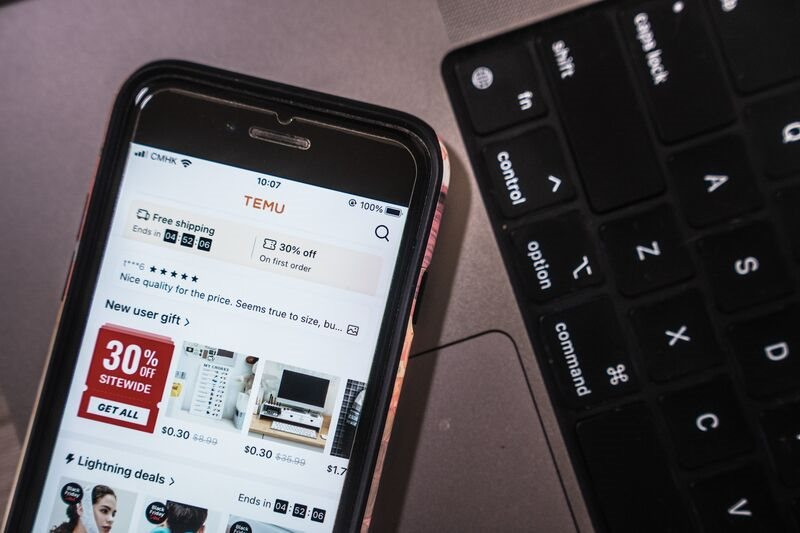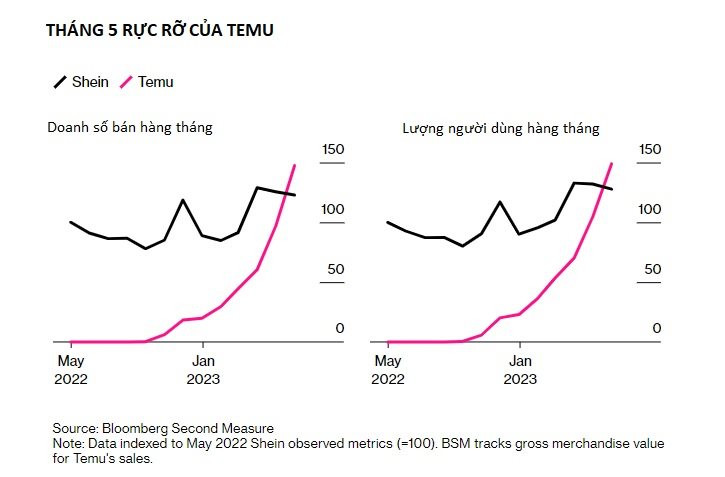Shein has been surpassed by a nameless ‘countryman’ app that fascinates Americans by selling everything in the world at ‘scary’ cheap prices.
- Tram Ho

This time last year, it was hard to find anyone in America who knew what Temu was. But right now, with US consumers grappling with hyperinflation, this low-cost shopping app backed by a Chinese tech company is enjoying huge success, with sales surpassing them.” countrymen” preceded by Shein.
Specifically, spending activity on Temu – an e-commerce application backed by PDD Holdings has increased by 20% compared to the well-known company Shein in the US in May according to statistics from Bloomberg Second Measure.
This Chinese-based online platform also became the number one iOS app in the US for most of the past year of 2023. To achieve this, Temu is aiming for massive discounts and offers. affordable prices on everything from kitchenware to shoes to attract new customers.
Temu also had more iOS downloads globally than any other shopping app in the six-month period following launch.
The above data makes Temu’s original North American sales target seem modest: The report shows that at least Temu’s GMV (total value of goods traded) in a single day surpassed Shein in October. September 2023.

Temu is the latest in a multitude of Chinese brands seeking to please American consumers who are becoming “more price-sensitive”. With Temu, PDD is hoping that they can repeat the successful formula of low-priced sales and social media activities as they did in China with the Pinduoduo app.
However, breaking into the US market is not easy. Chinese brands are very small in the US market compared to Amazon. Consumer spending on these websites still represents a small fraction of the amount spent on Amazon.com.
At the same time, more and more debates are emerging as to whether China’s simple “cop-paste” formula and Pinduoduo’s reliance on large supply chains can help Temu achieve sustained success. Are not.
And unlike Shein, which makes their own clothing brands, Temu is a 3rd party platform like Amazon and this means that only a very small amount of the end customer’s spending can be made. translates into Temu’s own revenue.
In addition, in the same month that Temu surpassed Shein in sales in the US, Shein also launched their own online platform here, allowing other brands to sell as well.
“The current economic environment is definitely helping Temu a lot as more consumers look to affordable things to deal with rising inflation. However, when the “music stops”, will the advertising machine still survive the burning of money?
Adam Blacker, a media expert, says that most brands’ app rankings are driven by downloads, but downloads are driven mainly by advertising campaigns for consumers to install.
Just a few months after launching in the US, Temu is also facing US authorities who fear data security risks after Google’s Android app temporarily banned Pinduoduo. Montana – the first state to also ban ByteDance’s TikTok and they also banned a few other Chinese-origin apps including Temu.
Shein was also quick to act to avoid a threat to her dominance when she sued Temu in a US court in December and said the app “willfully and blatantly infringes” on copyright and engages in “competition”. unfair and shady business practices,” including the use of Shein’s pirated images as part of the products listed on their platform.
To reduce prices, Temu asks suppliers to offer super cheap prices, and whoever offers the lowest price wins the order. This raises concerns that some factories will be forced to defy quality to win contracts.
One clothing factory owner in Guangzhou, who asked not to be named, said that his routine while working for Temu was to take pictures of the most popular items on the app and find suppliers who could provide cheap materials. best. And doing so inadvertently sparked a price war on the supply chains in China.
However, these concerns have yet to deter American consumers. In what could be the biggest move in the US, Temu appeared at the Super Bowl in February, running a 30-second commercial showing a happy shopper dancing in a flashy outfit. but cheap.
“ Temu’s growth is unimaginable. However, the app is too new and we don’t know what the future of Temu will be .”
Source: Bloomberg
Source : Genk
